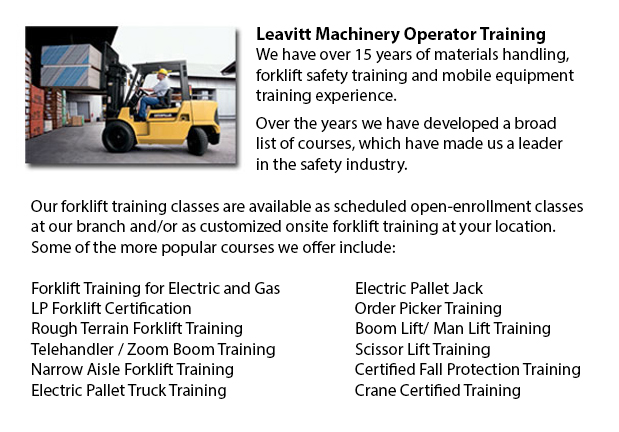
Richmond Hill Forklift Training Classes - Forklifts are a type of heavy lifting equipment utilized in order to move and handle material safely and efficiently. Sometimes known as Lift Trucks, they are utilized in a variety of industries. Personnel working around and with lift trucks should be trained to spot hazards associated with the utilization of lift trucks.
We offer forklift training classes to be able to teach our trainees how to safely operate a lift truck. The theory portion of the course would include instruction and classes on becoming a forklift operator. Those training will learn their legal tasks as forklift operators. Upon finishing the classes, a printed certificate will be issued. The certificate should be signed by an individual authorized to verify that a hands-on evaluation has been completed in the workplace of the trainee.
Forklift Safety
Forklift trucks are vital in industrial workplaces for their ability to lift and transport heavy loads. Forklifts are indispensable to several industrial worksites, but lift trucks can be dangerous without correctly training employees. Lift truck injuries, when they take place, tend to be serious because of the power of these heavy machinery. Workers who work often around lift trucks can become complacent and forget the dangers. Important operating and maintenance measures might be ignored.
Forklift training is necessary not only for new staff. Periodic re-training is essential for all operators. First aid training is likewise vital.
The daily inspection is critically important in the day to day maintenance and operations of a lift truck. The lift truck may become damage if not correctly maintained. Before being utilized, lift trucks must be visually inspected as to their general condition. An operational inspection must be done to determine the machinery is correctly functioning. The supervisor should be informed if anything is noted that can impact the safe operation of the forklift.
A check determines if the area is clear of objects that could pose a hazard. Any overhead obstructions must be noted. Check that a working fire extinguisher is accessible. Different levels must be checked, like for example fuel, radiator water, engine oil, and electrolyte levels in cells. Plugs, batteries and cables should be inspected. Clean out vent caps and make certain that bolts, nuts, guards, chains, and hydraulic hose reels are not loose, damaged or missing. A tire check would ensure that wheels are not damaged or worn. Pneumatic tires will require a pressure inspection.
-
Richmond Hill Manlift Operator Training
Richmond Hill Manlift Operator Training - The aerial lift or manlift is a specialized type of hydraulic platform that is meant to lift an individual vertically giving it an alternate name of a vertical personnel lift. These machines are widely used f... More -
Richmond Hill Boom Lift Training
Richmond Hill Boom Lift Training - Aerial platforms or likewise known as elevated work platforms are devices that enable workers to perform tasks and duties at elevated heights which would not be otherwise accessible. There are a variety of aerial li... More -
Richmond Hill Overhead Crane Safety Training
Richmond Hill Overhead Crane Safety Training - Overhead crane safety training equips operators with knowledge and skills about crane safety measures, accident avoidance, materials handling, and machinery and stock protection. Trainees will learn the... More -
Richmond Hill Heavy Equipment License
Richmond Hill Heavy Equipment License - A heavy equipment license could be acquired by taking a certification and preparation course at a private training school or a vocational school. This license would qualify you to operate many kinds of heavy ma... More -
Richmond Hill Manlift Training
Richmond Hill Manlift Training - Various manlift training programs consist of the review and content of manlift devices. An important part of the program is the practicum where students show their knowledge and practical ability to safely operate a m... More -
Aerial Lift / Boom Lift / Man Lift / Scissor Lift Training in Richmond Hill
Scissor platform lifts are forklift tables that elevate things and individuals and goods vertically. They are often used in industrial, construction and commercial environments. A common use of scissor platform lifts is for lowering or lifting constr... More -
Richmond Hill Scissor Lift Safety Training
Richmond Hill Scissor Lift Safety Training - A scissor lift is a kind of platform lift that moves vertically. The lift table is moved in a vertical motion because of criss-cross folding supports which are linked in what is known as a pantograph. The... More -
Richmond Hill Heavy Equipment Training
Richmond Hill Heavy Equipment Training - The two most common types of heavy equipment training are classed into the categories of equipment; machines which is fashioned with tracks and those with rubber tires. The tracked vehicle are heavy duty machi... More

Forklift Certification Richmond Hill
TOLL FREE: 1-888-254-6157
Richmond Hill, Ontario
forkliftcertificationrichmondhill.com
Email Us
About Us


